Psychological manipulation is indirect, deceptive, and backhanded. Ever faced this kind of sneaky control in your life? Explore ways to fight this!
Psychological manipulation is the exercising of toxic influence on someone through mental and emotional exploitation, with the aim of controlling and coercing the victim into a position of disadvantage. The manipulator uses indirect, deceptive, or underhand schemes to serve his or her own agenda at the victim’s expense.
Psychological manipulation is damaging and can be subtle, making it hard to recognize it. But it’s essential to understand what’s happening and find ways to combat it. So if you know the kinds of psychological manipulation, and how they look like, then maybe you will find it easier to cope with.
5 Types Of Psychological Manipulation
1. The Guilt Trip
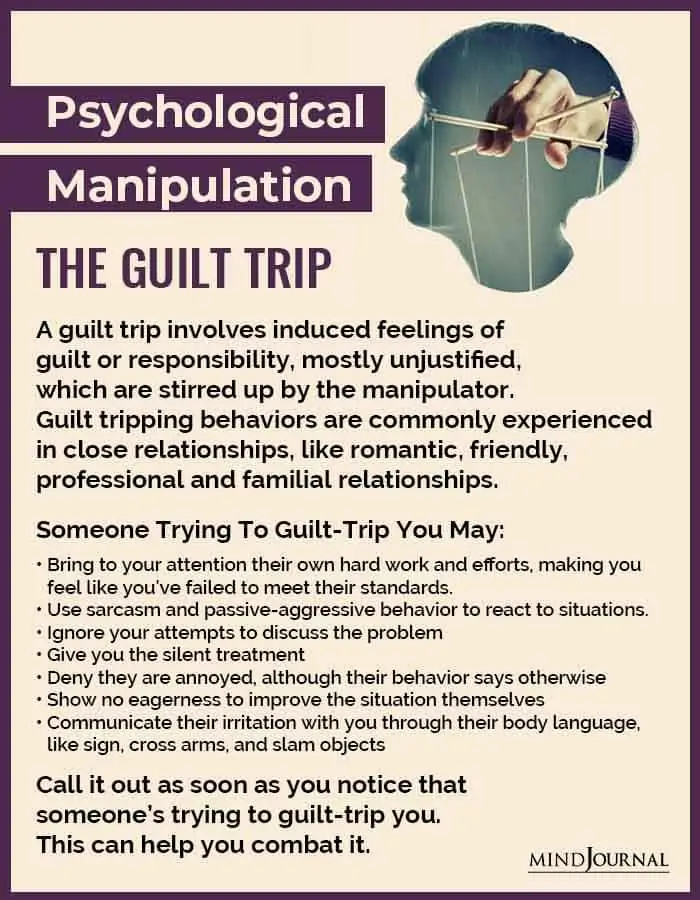
A guilt trip involves inducing feelings of guilt or responsibility, mostly unjustified, which are stirred up by the manipulator. Guilt-tripping behaviors are commonly experienced in close relationships, like romantic, friendly, professional, and familial relationships.
Someone Trying To Guilt-Trip You May:
1. Bring to your attention their own hard work and efforts, making you feel like you’ve failed to meet their standards.
2. Use sarcasm and passive-aggressive behavior to react to situations.
3. Ignore your attempts to discuss the problem.
4. Give you the silent treatment.
5. Deny they are annoyed, although their behavior says otherwise.
6. Show no eagerness to improve the situation themselves.
7. Communicate their irritation with you through their body language, like sighing, crossing arms, and slamming objects.
Call it out as soon as you notice that someone’s trying to guilt-trip you. This can help you combat it.
Related: 9 Ways Your Partner Uses Guilt Trips You To Get What They Want
2. Gaslighting
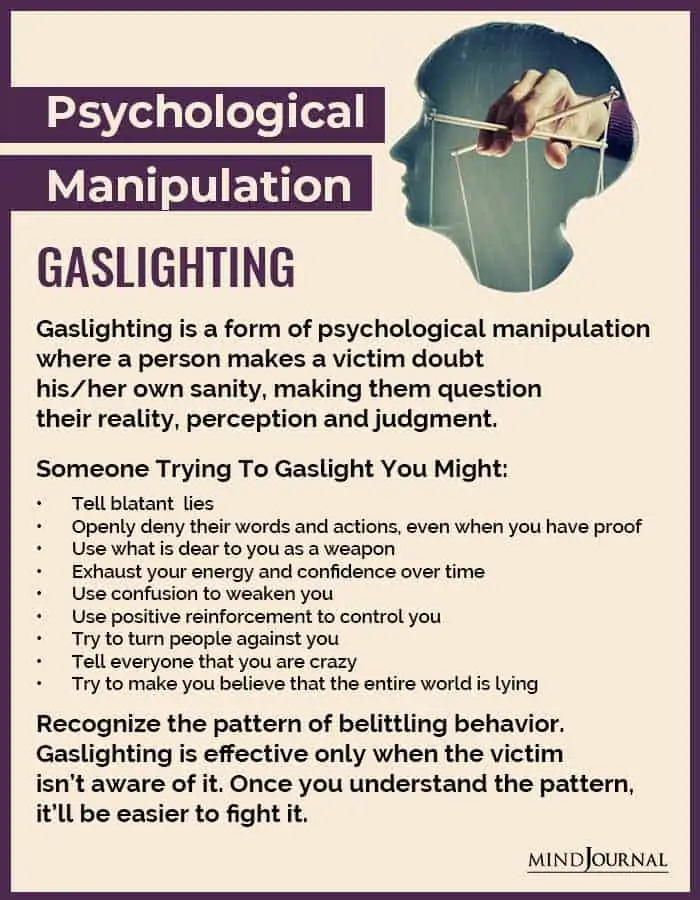
Gaslighting is a form of psychological manipulation where a person makes a victim doubt their own sanity, making them question their reality, perception, and judgment. This is done in order to keep the victim in control, so that the manipulator can exploit them any way they want.
Someone Trying To Gaslight You Might:
1. Tell blatant lies.
2. Openly deny their words and actions, even when you show them proof.
3. Use what is dear to you as a weapon.
4. Exhaust your energy and confidence over time.
5. Use confusion to weaken you.
6. Use positive reinforcement to control you.
7. Try to turn people against you.
8. Tell everyone that you are crazy.
9. Try to make you believe that the entire world is lying.
Recognize the pattern of belittling behavior. Gaslighting is effective only when the victim isn’t aware of it. Once you understand this form of psychological manipulation, it’ll be easier to fight it.
3. Peer Pressure
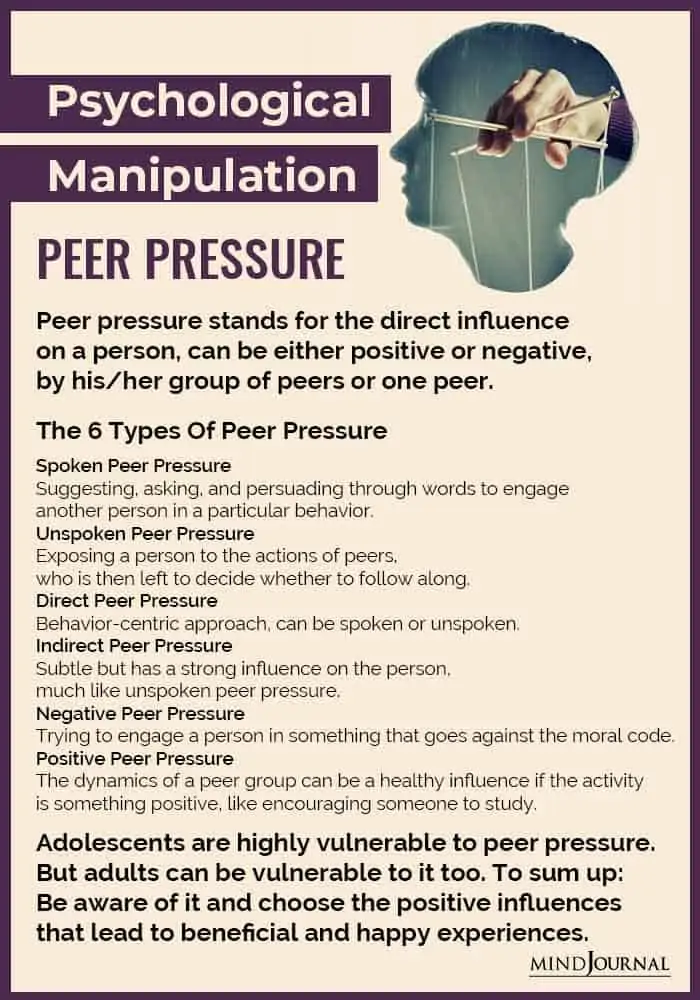
Peer pressure means when you are directly or indirectly forced to do something despite not being comfortable with it, by a peer or a group of peers. Peer pressure normally happens in friendships.
6 Types Of Peer Pressure:
1. Spoken Peer Pressure
Suggesting, asking, and persuading through words to engage another person in a particular behavior.
2. Unspoken Peer Pressure
Exposing a person to the actions of peers, who is then left to decide whether to follow along.
3. Direct Peer Pressure
A behavior-centric approach – can be spoken or unspoken.
4. Indirect Peer Pressure
Subtle but has a strong influence on the person, much like unspoken peer pressure.
5. Negative Peer Pressure
Trying to engage a person in something that goes against the moral code.
6. Positive Peer Pressure
The dynamics of a peer group can be a healthy influence if the activity is something positive, like encouraging someone to study.
Adolescents are highly vulnerable to peer pressure. But adults can be vulnerable to it too. To sum up: Be aware of it and choose the positive influences that lead to beneficial and happy experiences.
Related: Moral Rebel: Here’s Why Some People Can Stand Up to Social Pressure
4. Negging
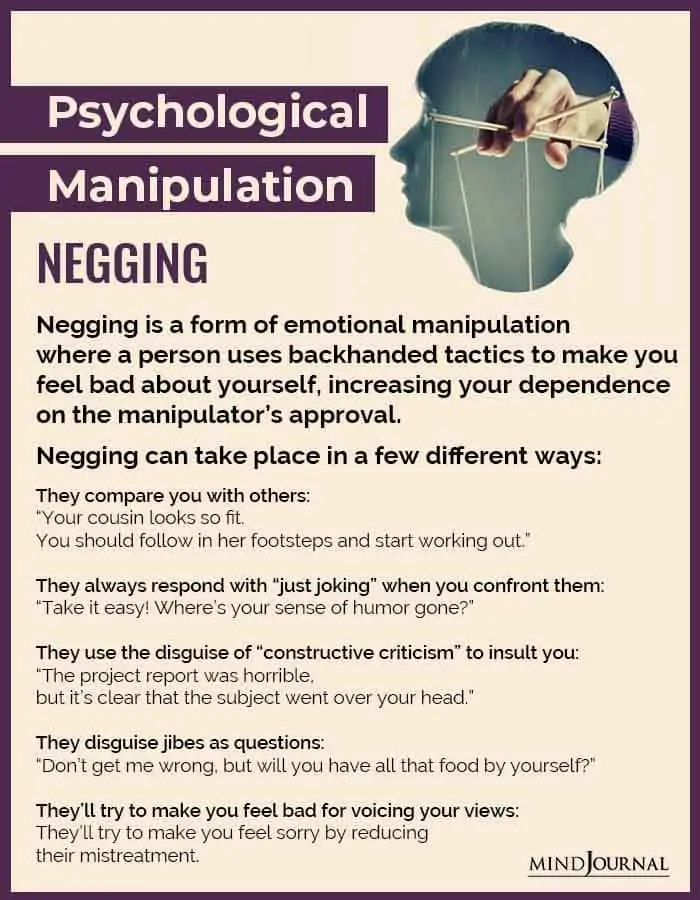
Negging is a form of emotional manipulation where a person uses backhanded tactics to make you feel bad about yourself, increasing your dependence on the manipulator’s approval.
Negging can take place in a few different ways:
– They make backhanded compliments:
“Now, don’t you look dashing?” I would never find the courage to style my hair that way!”
– They compare you with others:
“Your cousin looks so fit. You should follow in her footsteps and start working out.”
– They always respond with “just joking” when you confront them:
“Take it easy! Where’s your sense of humor gone?”
– They use the disguise of “constructive criticism” to insult you:
“The project report was horrible, but it’s clear that the subject went over your head.”
– They disguise jibes as questions:
“Don’t get me wrong, but will you have all that food by yourself?”
– They’ll try to make you feel bad for voicing your views:
“He might have molested you, but filing the police complaint will destroy his life.”
5. Emotional Blackmail
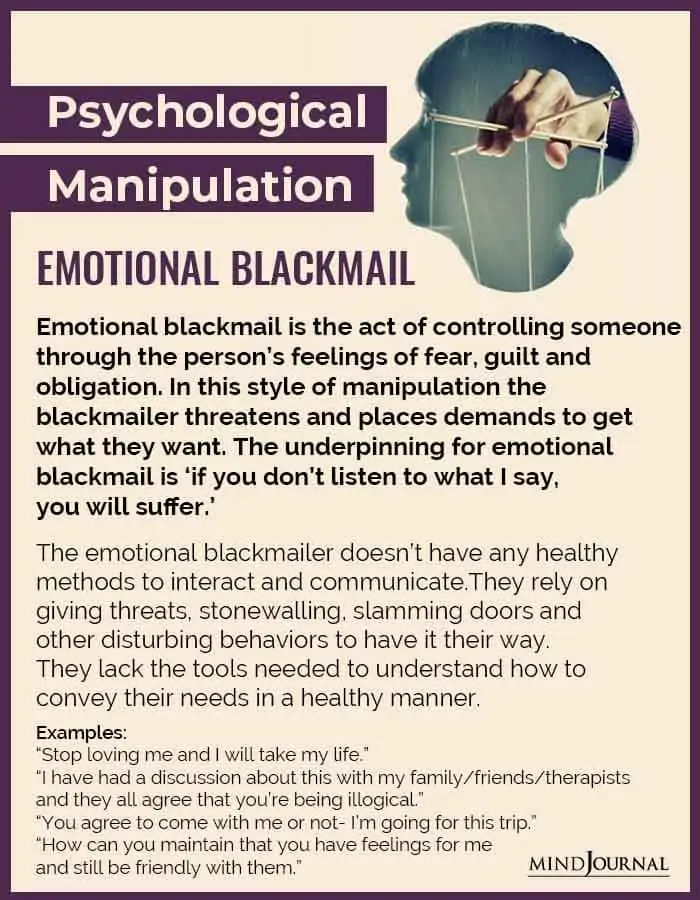
Emotional blackmail is the act of controlling someone by taking advantage of that person’s feelings of fear, guilt, and obligation. In this style of psychological manipulation, the blackmailer threatens and places demands to get what they want. The underpinning for emotional blackmail is ‘if you don’t listen to what I say, it means you don’t love me.’
The emotional blackmailer doesn’t have any healthy methods to interact and communicate. They rely on giving threats, stonewalling, slamming doors, and other disturbing behaviors to have it their way. They lack the tools needed to understand how to convey their needs in a healthy manner.
Examples:
– “Stop loving me and I will kill myself.”
– “I have had a discussion about this with my family/friends/therapists and they all agree that you’re being illogical.”
– “You agree to come with me or not- I’m going for this trip.”
– “How can you maintain that you have feelings for me and still be friendly with them.”
Related: Emotional Blackmail and Its 7 Signs
How To Deal With Manipulative People
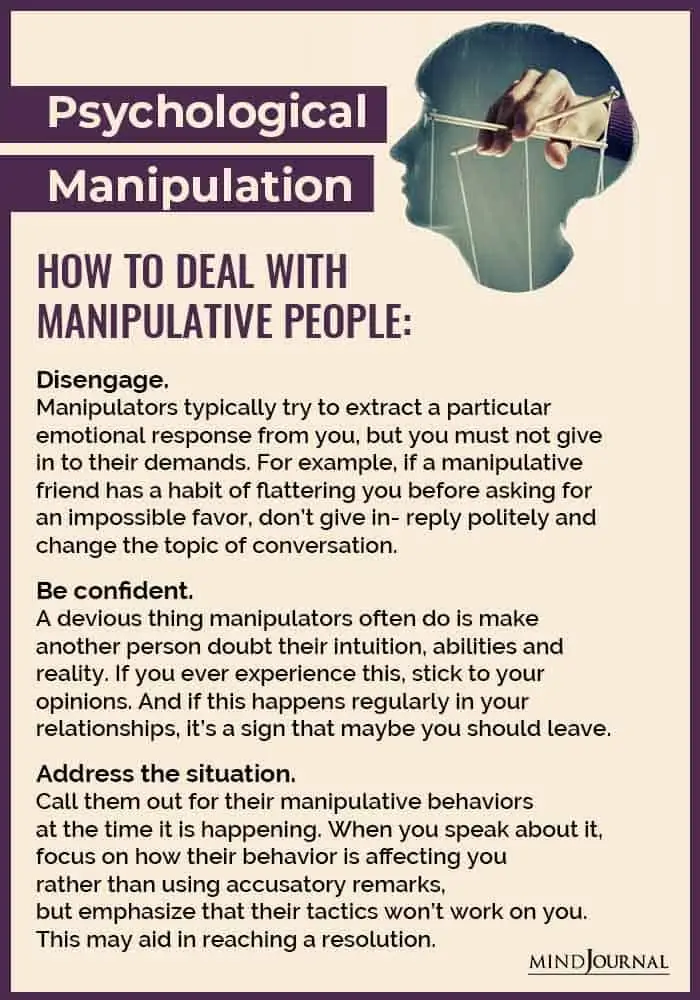
1. Disengage.
Manipulators typically try to extract a particular emotional response from you, but you must not give in to their demands. For example, if a manipulative friend has a habit of flattering you before asking for an impossible favor, don’t give in- reply politely and change the topic of conversation.
2. Be confident.
A devious thing manipulators often do is make another person doubt their intuition, abilities, and reality. If you ever experience this, stick to your opinions. And if this happens regularly in your relationships, it’s a sign that maybe you should leave them for good.
3. Address the situation.
Call them out for their manipulative behaviors at the time it is happening. When you speak up about it, focus on how their behavior is affecting you rather than using accusatory remarks, but emphasize that their tactics won’t work on you. This may aid in reaching a resolution.
Related: 15 Red Flags Of Manipulative People
Mental Impact Of Manipulation

Victims Of Long-term Manipulation May:
- Have depression
- Experience anxiety
- Resort to unhealthy coping mechanisms
- Develop a habit of pleasing the manipulator
- Hide their feelings or lie about them
- Constantly prioritize other people’s needs over theirs
- Find it hard to trust anyone
In certain cases, manipulation can be so chronic that victims begin to doubt their perception and sense of reality.
Related: How To Spot Manipulation
It’s Possible To Protect Yourself And Stay Safe

Always remember that you are not alone. Communicate with others. Sharing what you’re going through with someone you trust helps to understand, validate and cope with your emotions. It can help you stay hopeful during the darkest times.
Confiding in a trusted person has two-fold benefits: You find a support system that helps you process what you’re experiencing, and you can spend time with a friend away from your abuser. Work towards forming your own group of people who will always be there for you.
To connect with a crisis counselor text “Hello” to 741741. ( Keeping your own safety in mind, it is advisable to delete the texts after the conversation, especially if your abuser has access to your personal devices)
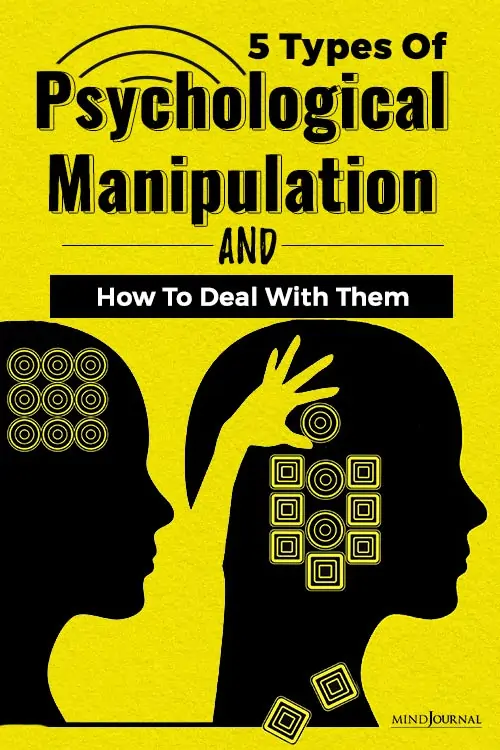










Leave a Reply
You must be logged in to post a comment.